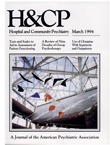Nicotine Dependence and Schizophrenia
Abstract
The following recommendations are offered for evaluating and treating nicotine dependence among patients with schizophrenia.
Assessment of patients's nicotine usage should be a routine part of psychiatric evaluation and treatment planning.
Heavy smokers should be closely evaluated for other substance abuse.
Clinicians should be aware that smoking cigarettes alters the metabolism of psychiatric medications and reduces blood levels of neuroleptics and some antidepressants and benzodiazepines.
Clinicians should take intoaccount that both nicotine usage and withdrawal may alter the symptoms of schizophrenia and medication side effects.
Smoke-free units should consider the impact of forced nicotine abstinence on patients who smoke and should establish goals and strategies for treating nicotine dependence.
Researchers should consider the role of nicotine withdrawal and usage as an important covariate in studies of schizophrenia.
Prospective, longitudinal research that assesses the relationship between nicotine dependence and schizophrenia is needed.
Access content
To read the fulltext, please use one of the options below to sign in or purchase access.- Personal login
- Institutional Login
- Sign in via OpenAthens
- Register for access
-
Please login/register if you wish to pair your device and check access availability.
Not a subscriber?
PsychiatryOnline subscription options offer access to the DSM-5 library, books, journals, CME, and patient resources. This all-in-one virtual library provides psychiatrists and mental health professionals with key resources for diagnosis, treatment, research, and professional development.
Need more help? PsychiatryOnline Customer Service may be reached by emailing [email protected] or by calling 800-368-5777 (in the U.S.) or 703-907-7322 (outside the U.S.).



